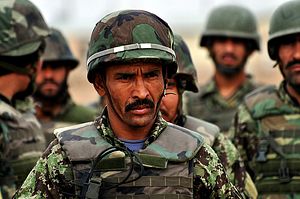After a temporary period of détente between the Pakistan and Afghanistan, relations between the two countries have again shifted to their conventional pattern of hostility and distrust. Afghan President Ashraf Ghani’s office, in a recent press release, said that the Haqqani network is still intact, and Pakistani claims of having disrupted the group’s infrastructure are a mere repetition of claims made by authorities for over a decade now. On the other hand, however, Pakistan insists that group doesn’t operate from its tribal areas anymore.
Months ago, the Afghan president candidly commended Pakistan’s sincere efforts toward enabling the Afghan peace process, and both countries mutually acknowledged growing bilateral cooperation, with Pakistan’s interior minister claiming that “relations between Afghanistan and Pakistan have never been better.” Fast forward a few months and, in a predictable turn of events, Afghanistan is alleging that Pakistan is not doing enough to control elements wreaking havoc in Afghanistan. Meanwhile, Pakistan maintains that 80 percent of the insurgency originates from within Afghanistan. Hence, despite an Islamabad-supported Pashtun president in office, the trust deficit between the neighbors has again descended into the abyss, with the Murree peace process yielding no results.
While it remains uncertain how sincere Pakistan’s efforts have been in pushing the Afghan peace process forward given the historic burden of Pakistan’s deep involvement in Afghanistan, it’s certain that any reconciliation efforts – short or long term – from Pakistan are likely to be met with cynicism from the Afghan leadership, irrespective of their ethnic background. The history that led to these perceptions of Pakistan in Afghanistan is worth understanding to get an idea of why reconciliation endeavors from the Pakistani side are likely to be met with Afghan skepticism.
Pakistan’s relations with its western neighbor, Afghanistan, didn’t get off to a very good start. Afghanistan tried to use British decolonization as an opening to question the validity of the Durand line and also started making territorial claims in relation to Pakistan’s Pashtun areas and even patches of Balochistan. Moreover, Afghanistan was the only country which voted against Pakistan’s entry into the United Nations, back in 1947. Ever since then, the border between Pakistan and Afghanistan has remained porous, particularly in the tribal areas of the North-West Frontier Province.
During and after the Cold War, Pakistan supported certain ethnic groups in Afghanistan, contributing to deep ethnic divisions. After the Soviet Union’s withdrawal from Afghanistan, Pakistani policy-makers presumed that Islamabad, after having played substantial role in Soviet Union’s defeat in Afghanistan, had earned the right to stay as a dominant player so that it could influence country’s future to suit its own interests.
When Pakistani-backed agents could not win influence over Kabul, Pakistan cashed in on a new rising power: the Taliban. Those in Islamabad who were responsible for Afghan policy saw the Taliban as a rising opportunity which could serve Pakistan’s interests better than the old policy of supporting feuding Mujahideen, which had only frustrated Pakistan. For Pakistan, the Taliban, therefore, represented a force that could unify Afghanistan while keeping it close to Pakistan. The ascendancy of the Taliban in Afghanistan further destroyed an already deteriorated Afghan state and sowed more hatred for Pakistan in the country.
Pakistan’s post-9/11 policy, which further cemented the country’s hostile image in Afghanistan, was paradoxical to an extent. Islamabad largely continued its pre-9/11 approach. While Pakistan openly agreed to cut ties with the Taliban following the U.S. invasion, it continued supporting them covertly.
In post-9/11 Afghanistan, with the ascendancy of the Northern Alliance in Kabul, which has historically remained very critical of Pakistan’s involvement in Afghanistan, Pakistan’s influence in Afghanistan gradually declined while India gained more influence. Pakistan has always been uneasy about its western neighbor, Afghanistan, for having close relations with India. From Islamabad’s perspective, the assumption has been that India’s strategic penetration inside Afghanistan increases Kabul’s hostility toward Pakistan, which either increases the risk of Pakistan’s encirclement or raises the prospect of collusion between Afghanistan and India. Either way, it is detrimental to Pakistan’s interests. Therefore, Pakistan attempts to curtail India’s influence in Afghanistan and seeks a government in Kabul that is supportive of its interests–or at least not actively antagonistic to its interests.
With a Pashtun president in office, Pakistan has again tried to reach out to Kabul, largely on its own terms. While the Afghan Taliban have continued a relentless torrent of suicide attacks on Kabul, Pakistan has consistently been pushing the Afghan government to sit in a second round of talks with Taliban. The Taliban’s internal schism after Mullah Omar’s death has further complicated Afghanistan’s militant problem, with disillusioned Taliban leaders joining the Islamic State. This complicated security situation poses additional challenges to the reconciliation process as Afghanistan has repeatedly said that most of these attacks are being coordinated from Pakistan. Pakistan, in the meantime, has denied and condemned such statements.
Amid all these challenges, the historic burden of Pakistan’s deep interventionist engagement in Afghanistan is not likely to go away soon despite Pakistan’s apparent earnest efforts to resolve bilateral security issues. Moreover, if both countries truly want to bridge their mutual void of distrust, they should do more to address each other’s security concerns. It’s time that Pakistan and Afghanistan look beyond the blame game.
Umair Jamal is a graduate of School of Government and International Affairs, Durham University. He is a research fellow with the Centre for Governance and Policy, a public policy think-tank in Lahore. Follow him on Twitter: @UJAmaLs.
Hafeez-ur-Rehman Hadi is a political economist, and works as a Research Associate at a policy Institute, Centre for Governance and Policy, Lahore. He tweets as @hrhadi92.

































